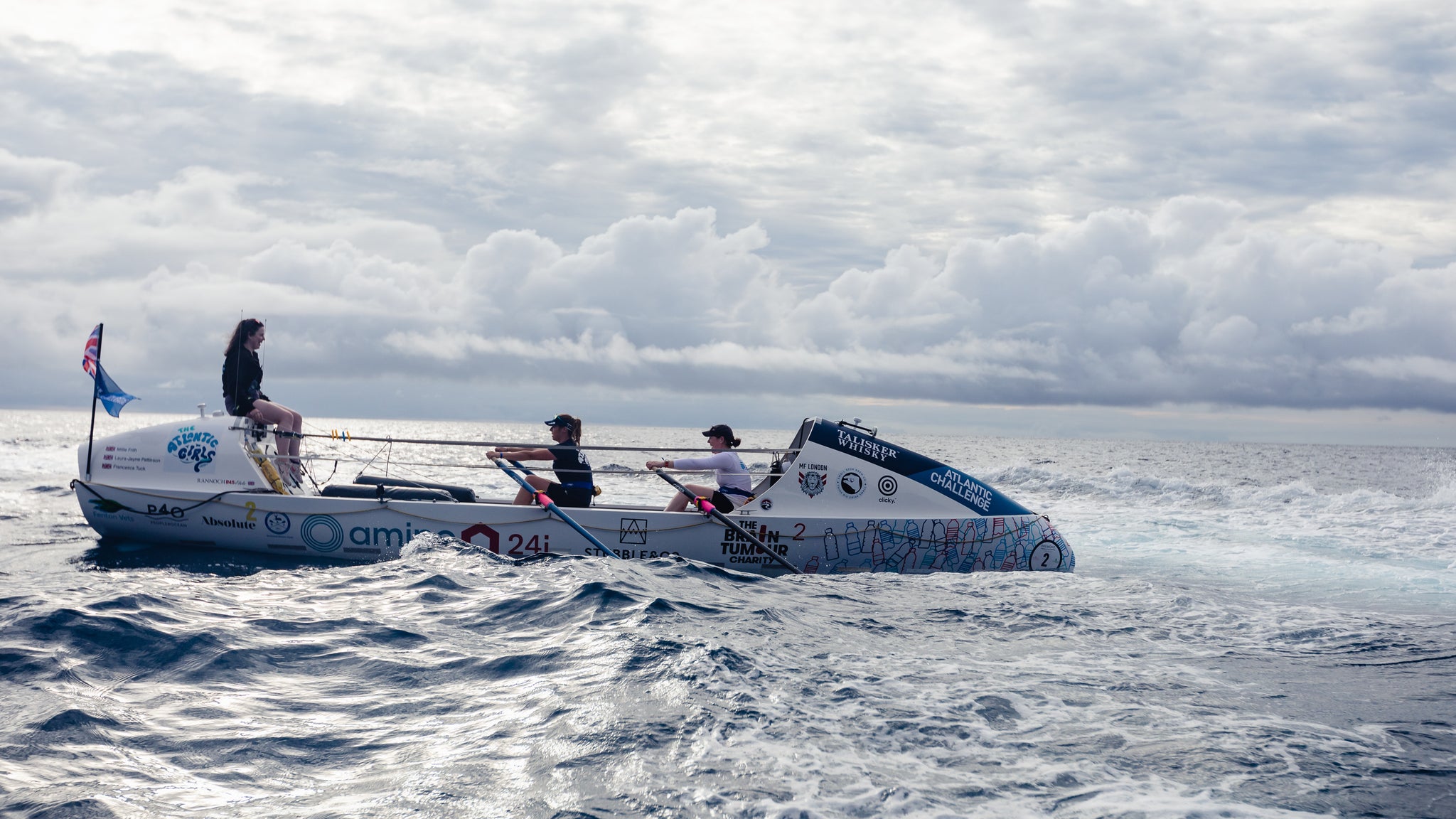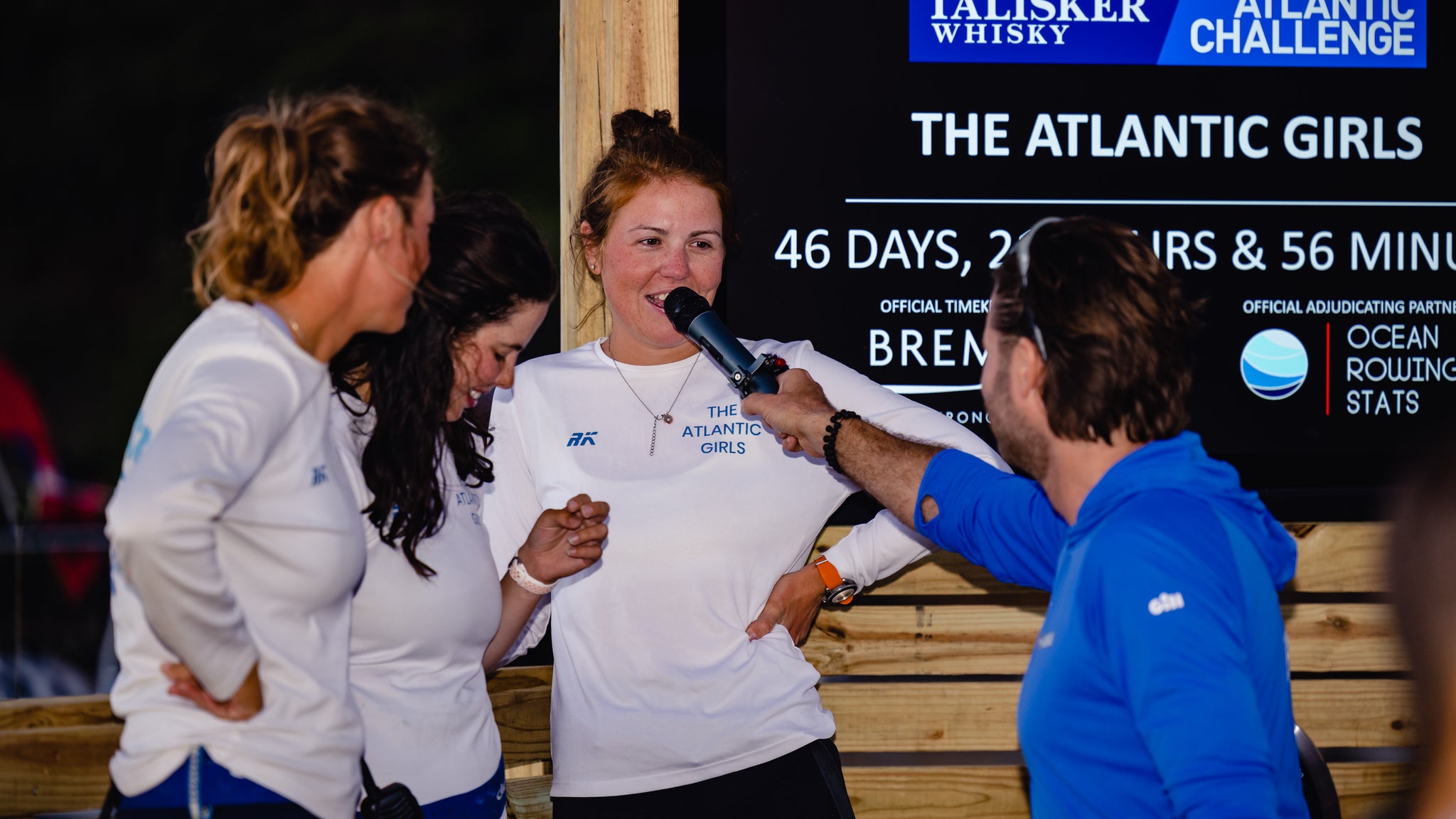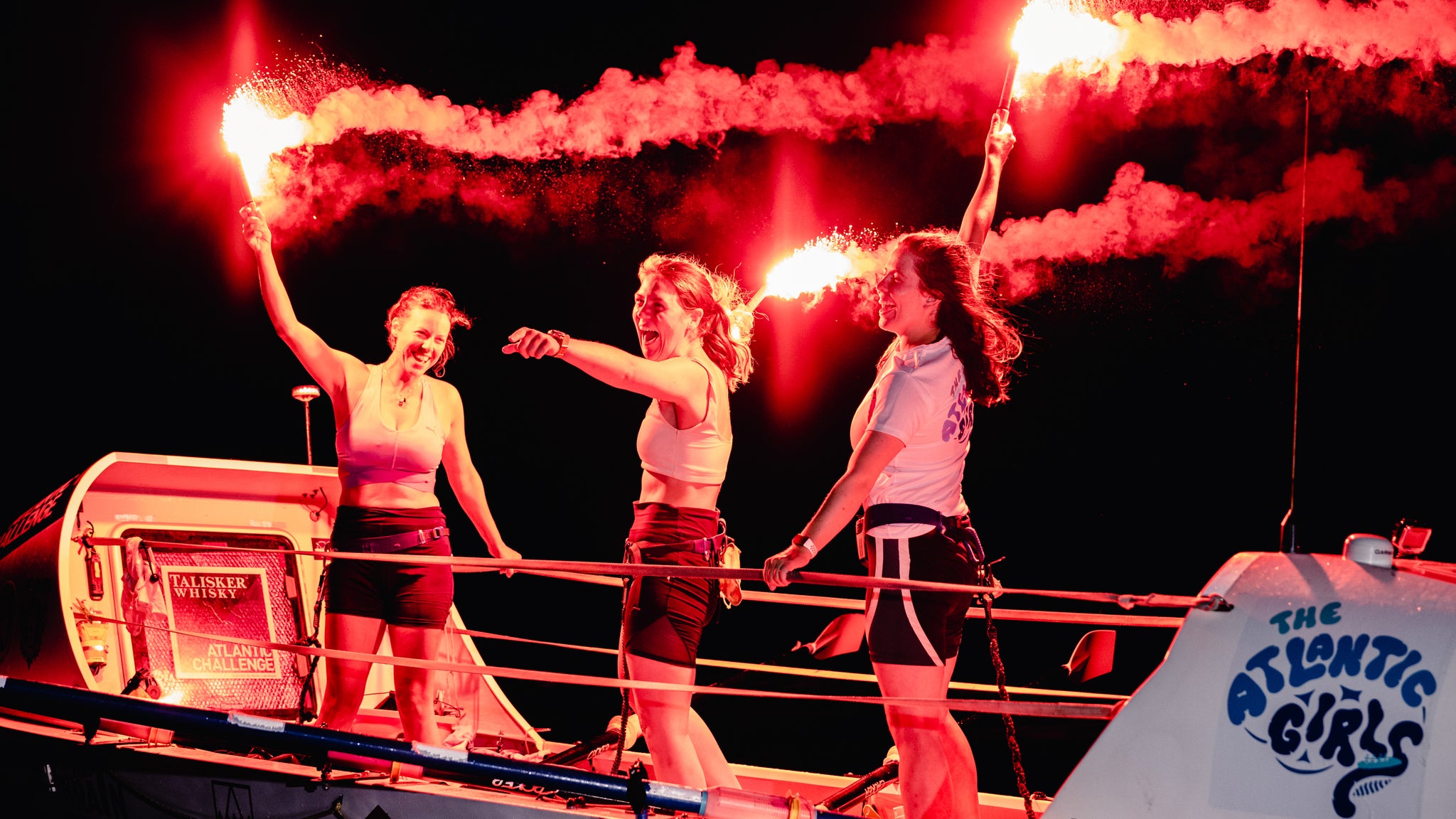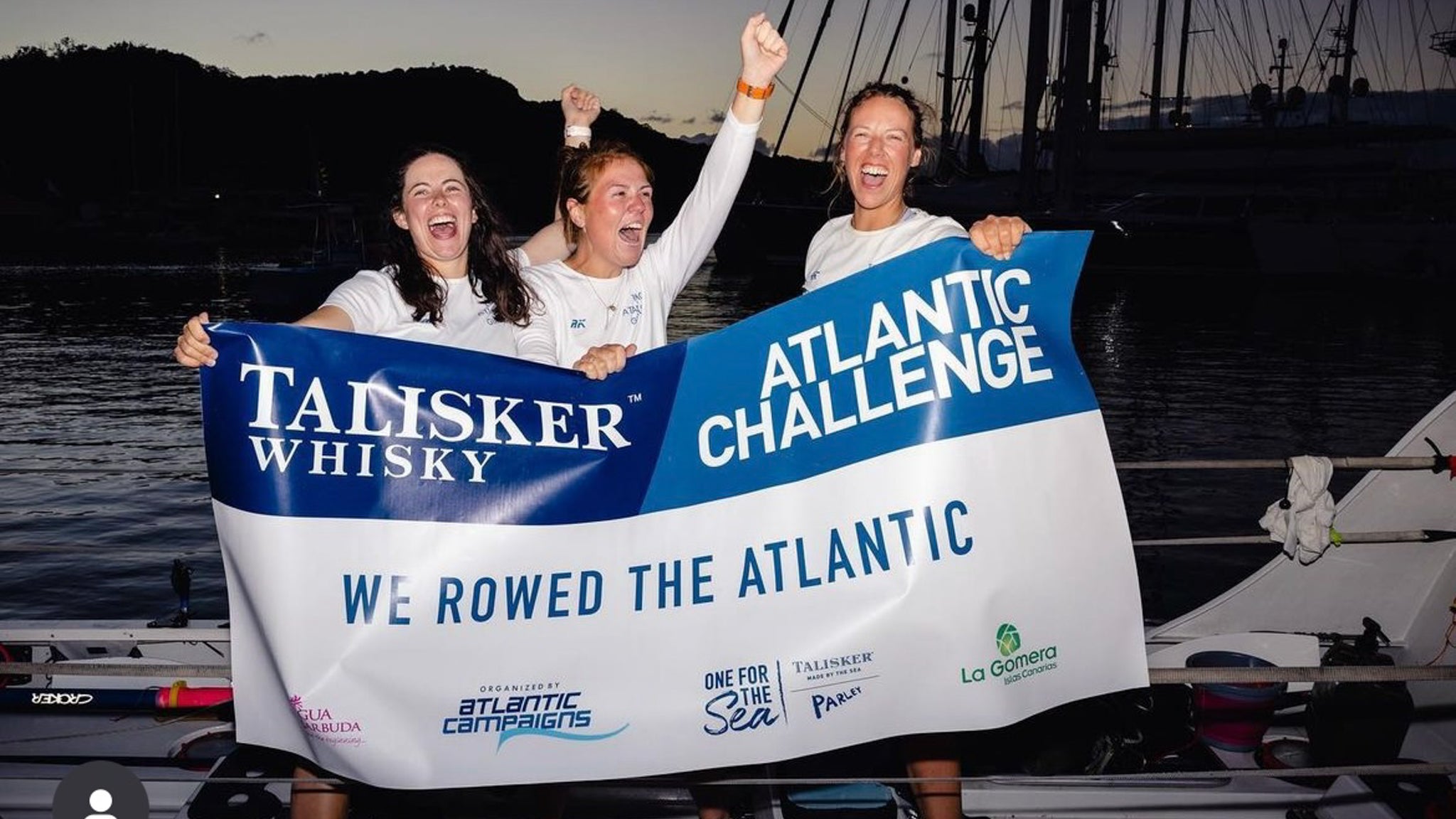

This International Women’s Day, we’re celebrating three extraordinary women that took on a herculean challenge, overcoming some of the most extreme conditions on the planet to embrace an adventure of a lifetime. That adventure was the Talisker Whisky Atlantic Challenge.
At sea for 46 days, 21 hours and 56 minutes, these three girls conquered the almighty breadth of the Atlantic Ocean, rowing the 3000 nautical miles from La Gomera in the Canary Islands to Antigua as they raced over 30 other crews. Pushing them to the limits mentally, physically and emotionally, more people have climbed Mount Everest than have rowed unsupported across the stormy swells of the Atlantic Ocean. And yet, what Millie, Laura and Frankie achieved is an even rarer feat than meets the eye because, in the 12 years this challenge has been running, they joined only a handful of women to have attempted this crossing with an all-female crew.
We caught up with Millie and Laura to learn more about this enormous achievement: the highs, the lows and all the unforgettable moments in between.
“We wanted to inspire others, especially women and young people who are dreamers, adventurers and out-of-comfort zoners, to get out and find that thing that makes your heartbeat a little faster.”
I’m Laura Jayne Pattinson, a 27 year old veterinary surgeon from West Yorkshire and, apparently, I have an inability to turn down a challenge. And I’m Millie Frith, a 26 year old office manager living in London that seems to love putting myself through endurances challenges, don’t ask why. Frankie (who can’t be here today), is a 31 year old finance manager from Bath. Really, we are just three ordinary girls working three ordinary jobs.
How did you all meet?
Laura: About 3 years ago, I remember Katy, the girl who brought us all together, bribing some university friends with dinner and pitching them the idea over some sub-standard pasta dish. Of course, the concept of rowing ourselves 3000 miles unsupported across an ocean was met with a universal look of madness. Except I was crazy enough to say yes.
Millie: As for me and Frankie, we didn’t know each other or the other girls. We simply saw an advert on Explorers Connect, put our names into the hat, somehow got chosen and, well, the rest is history. This was back in 2020, when the first lockdown came in. So, yeah, three years ago now. I’ve felt compeled to undertake this challenge ever since watching a Netflix documentary called ‘Losing Sight of the Shore’.

Can you explain what the Talisker Atlantic Challenge is?
Now we’ve rowed it, it’s like 3000 miles of heaven and hell. But if you’d asked us before we’d set off, we’d have said it was the adventure of a lifetime and an incredible opportunity to test your fitness, resilience, mental toughness and your sea skills as you rowed 3000 miles across the Atlantic Ocean.
How do you prepare for such a mammoth challenge?
It all starts with the theoretical side, which involves compulsory courses like sea survival courses, navigation, first aid. It’s basically a week-long intensive course to get you up to scratch with the minimum of what we’d need. After that, it was on us to put in the work. Luckily, we all come from different sporting backgrounds, so we did our own personalised workouts that focussed on our fitness, and then we would come together for the more team-oriented tasks. After that, it was just a matter of spending 120 hours at sea with our boat, which is another requirement before you can head to the start line. That’s where we got to enjoy the full experience, although Weymouth isn’t exactly anything like the middle of the Atlantic. It’s coastal rowing so you can only go out in very specific conditions. Those 120 hours are when you get used to the other side of things - sleep deprivation, sea sickness, the routine.
What was the dynamic on the boat like?
Oh, we were so lucky. We’re such different people, but we had a great time, as weird as that sounds. We laughed every day. Sure, there were days we cried, but for the majority of it, we had a great time together and never argued or fell out. And a big part of that was saving some of our better questions until we were underway so that we got to know each other properly out there. That’s when we were able to just have really good discussions.

What was a typical day like for you?
Wake up from whatever shift nap you're on, either the two hour sleep or the four hour sleep. Hopefully hit the sunrise shift because that's always the best, and then it’s about getting into a rhythm, finding that flow, and managing yourself. I would eat as much as physically possible between midday and mid-afternoon and then only have snacks… it’s just how your body adapts, but also those rehydrated meals are huge.
And then, once a week, you’d have to go overboard, into the ocean, to try and clean the underside of the boat of any barnacles. But the weather was always too choppy for any of us to stay in the water long enough to do a proper job. So in the end, we would sort of hang one of us over the side with goggles on and just try to scrub underneath the bow, which worked quite well.
What sort of foods were you eating?
Our favourite meal was this granola and raspberry cereal dish, which was so full of sugar and cream - it was about 900 calories for one pack. And then it was probably the macaroni cheese. Frankie definitely had the most varied diet. She would have things like kebab stews, or make beef hot pots. But the smell of those alone would make us feel really nauseous.
Did you have to endure any severe weather conditions?
Oh yeah. We had 10 days of severe winds and waves where we were forced to head south instead of steadily heading southwest, which didn’t impress us much. And then there was the heat. Most of us are real sunbaskers, but the temperatures kept getting hotter and hotter as we headed across the Atlantic, probably mid to high 30s, and then it would plummet at night to the point where it was pretty cold.
Five days in we had to weather a pretty insane storm too. We were fighting cross wind for the first few days, got through that and then the biggest waves turned up. They were like buildings, something we hadn’t trained for at all. So when they started coming down on us, that’s when the panic set in and we weren’t sure whether we should put the power anchor out, just keep rowing or even stop.
And is it easy to navigate yourself through that?
You kind of have to base it on what your gut says, and what you think you and the boat can cope with in terms of the wind. It’s almost about picking your battles and trying to understand the wind direction as best as possible. That’s because the wind can only hit you at a certain angle. If it hits you completely side on, you run the risk of capsizing, so we let it push us south and just did what we could. We took on this challenge for the journey rather than the racing aspect anyway so going with the flow was an easy decision.
There was also something different about your boat, right?
Yeah, so she's what they call an eco-boat, which is because she’s made slightly differently to all the other boats, using renewable materials. Actually, she is the first ocean rowing vessel of its kind, which is really cool. That’s also why she’s named Vaquita, which translates as ‘little cow’, a species of porpoise on the brink of extinction. They’re the world’s rarest marine mammal. But the coolest thing about her is the fact she’s just as strong and lightweight as other ocean rowing boats, but her core materials and the manufacture process were adapted to have a reduced environmental impact. She’s made from glass fibre that was manufactured using 100% renewable energy, resin that was 50% plant based, and a foam core that was made from 100% recycled plastic using over 10,000 plastic bottles. We just fell in love with the whole idea of her. We were rowing across the ocean, so to use a boat that had the planet in mind just felt right.
Can you tell us the moments or stories you’ll remember most?
The finish line. Reaching the end was a moment that we’d been building up to for weeks, and we were racing to get there. But the journey to that point was filled with epic moments, like when a minke whale swam beneath us. It was just so close and so curious and it just seemed so peaceful and gentle, and we just stopped rowing to watch it for a couple of hours. It was just incredible.
What about unsuspecting challenges? Did you have many of those to deal with?
Oh yeah. Seasickness was one. Millie suffered with that for the first stage and it kept creeping up throughout, which is a challenge in itself. And managing your energy levels is really tricky too. But because you don’t want to let the other girls down, you’re constantly trying to keep the standards high and keep pushing toward the finish line. That seasickness and nauseous feeling never really goes away though. Then it hit really hard when we got off the boat. Just a wave of nausea as you go from spending 46 days at sea to stepping on to land for the first time. It’s almost as if the land has become the sea.
What were those last days onboard Vaquita like?
The hardest. Easily the most challenging. The days felt so drawn out and the ocean felt like tar with every stroke. It felt like we just weren’t going anywhere. We were also like the 25th boat over the line, so we had it in our minds that we’d just be welcomed back to land by our families and friends, and that would have been enough. What we didn’t expect was to be greeted by so many people. Organisers and spectators, everyone cheering and shouting and setting off flares. In that respect, those last few days really summed up the challenge. We had to work harder just to even get there. It wasn’t easy at any point. It kept us humble and reminded us just how hard this challenge is. And because you don’t see Antigua until you’re only 30 nautical miles away, which is only hours of row time, it’s all so overwhelming.
And when the flares went off as you reached the finish?
Millie: I would definitely say that was the best day of my life. We didn’t expect that flare moment to hit quite like that. The feelings – the pride we had – that was the biggest thing for me. Realising the three of us had done it together, that was incredible. Truly mind blowing. It’s a mix of disbelief and intense pride.
Is there a lesson you’ve learned from this epic journey?
Don’t mess with the sea, the ocean will do what she wants to do. It humbled us at every moment.
